|
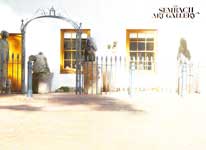
The Sembach Art Gallery
|
Text: Roger Toms
Hout Bay’s Sembach Gallery has recently passed another birthday which should have been the 1st of April but, as a display of serious intent, it opened on the 2nd!
The gallery is owned by David & Michelle Lincoln-Lewis who retained the name from the previous owner of the business. It is located in one of the town’s oldest buildings, certainly the oldest component of the Mainstream Centre where it is tucked away on the left-hand side of the Main Road entrance, on the bank of the Baviaans River. For those who know Hout Bay as a town of restaurants, the location is often referred to as “next door to Deez Mexican”.
The Sembach purveys works of art to the local cognoscenti as well to buyers from all over the world: David & Michelle are very familiar with the awkward business of exporting art of various forms. The gallery maintains close working relationships with local artists such that work can be commissioned to fit with a particular décor. In the meantime, it overflows with an eclectic collection of all types of paintings, sculptures in bronze and stone, and artifacts in steel. It is guarded by a fearsome-looking dog fashioned from welded-together automotive components: everyone loves it!
Some artists, who entrust the Sembach with their work, include:
- Angela Babaya
- Barbara White
- Helene Train
- Keith Calder (bronze sculptures)
- Lulli de Villiers-Hamman
- Robin Mann
- Rudolf Rieger (photography)
- Wilma du Toit
|
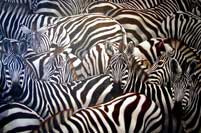
Artist: Andre Peypers
|
|
|
|
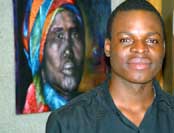 |
Keith Zenda, a visual artist from Zimbabwe, exhibiting his work in Cape Town at the Artscape
May/June 2007
 Contact Sheet Contact Sheet |
| Visual Artist Keith Zenda |
|
|
| |
 |
 |
 |
| Leopard |
Lion |
Cyclist with Chicken |
|
|
Broad-based
Black Economic Empowerment
(B-BBEE)
Workshop |
 |
Aligning the Tourism BEE Charter and Scorecard to the Department of Trade and Industry (the DTI) Codes of Good Practice
13 April 2007 at the Cape Sun, Cape Town
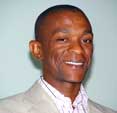 S'fiso Mthembu
S'fiso Mthembu
|
Text: S'fiso Mthembu
Background
The DTI Codes of Good Practice were approved and later gazetted to be binding on all organs of state. The challenge, however, remained that the Tourism Charter and Scorecard in its present form was not even close to the DTI’s Codes.
As a result, there was a need for the Tourism BEE Charter Council to align the Tourism Charter to the DTI Codes and it was felt that there should be consultations with different partners in all nine provinces.
Objectives
The main objective of the workshop was to solicit views and inputs from the tourism industry on how best we can achieve this alignment.
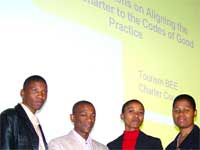 Raymond Mahole,
S'fiso Mthembu,
Phindile Dhlamini,
Judith Mhlongo
Raymond Mahole,
S'fiso Mthembu,
Phindile Dhlamini,
Judith Mhlongo
|
Achievement
Views expressed by the participants were incorporated into the draft Tourism Code that will be closely aligned to the DTI’s Codes. In addition, views expressed at the workshops were also discussed at the inaugural Annual Tourism BEE Conference - where further input was made to finalise the Tourism BEE Charter and Scorecard.
The reason for alignment is that it is the plan of the Tourism BEE Charter Council to make the Tourism Code binding to all state organs and those organizations doing business with Government.
The objectives were achieved in a sense that we were able to garner different views on various parts of the Tourism BEE Charter and Scorecard.
The way forward is that the Council will submit a draft Tourism BEE Charter and Scorecard to the Minister of Environmental Affairs and Tourism for him to apply for it to be gazetted.
|
|

Symposium, 18 April 2007, iziko museum, Cape Town
|
|
The State of Democracy in South Africa Today
|
|
|
Speach by: Dr Mathews Phosa
The year 2007 finds us thirteen years into a process that was marked into history with the April 1994 elections.
It is part of history now that the ANC won a landslide victory then and became the government. In the two elections since then the governing party has increased it’s share of the votes each time.
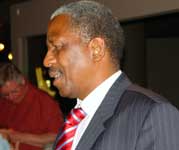 Dr. Matthew Phosa
Dr. Matthew Phosa
|
In the current absence of meaningful opposition there rests on the party a huge burden to ensure that the democratic principles that it fought for, remains in place through appropriate policies and institutions.
We have to remind ourselves repeatedly that we cannot again be party to creating a system of government that is based on minority rule, on discrimination and on the abuse of human rights.
I do, however, believe that we have made substantial progress since the 1994 elections.
What are the results that we have seen since then:
- Three openly contested multi-party elections in 1994, 1999 and 2004
- The completion of an internationally recognized Constitution
- The protection of human rights in that very Constitution as well as in a number of institutions, notably the Human Rights Commission
- An open society within which the free exchange ideas are encouraged
- A strong South African economy
- Excellent relationships between the government and the private sector
- A South Africa that is active in building regional, continental and global institutions and policies
- A country that has become a preferred destiny for global events such as the Rugby World Cup, the Cricket World Cup and the 2010 Soccer World Cup
- A society that has moved from a polarized one to one within which people can live normal lives as equals
In short then, we have been the privileged participants and spectators of a process wherein we made the dramatic journey from a minority to a majority government without the trauma and doom that some predicted.
.......
Click here for the full speach Printer Friendly Version Printer Friendly Version
‘Minority Vs. Majority’ Paradigm Obstructs Transformation
The Constitution offers South Africans the rights required to participate in its governance. ROELF MEYER asks whether we are claiming ownership of them.
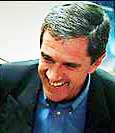 Roelf Meyer
Roelf Meyer
Courtesy BBC News
|
2007 will probably be the most important political year since the country’s democratic transition in 1994. From 2009 South Africa will have a new president, and the national conference of the African National Congress in December will provide the first concrete indication of who that person might be. The choice of candidate will arguably be one of the critical factors that shape South Africa’s future between 2009 and 2014, and possibly for another five years after that.
This year may therefore be the beginning of a new phase in our democracy. Before we enter this new era, it may serve us to pause and take stock of our achievements over the past thirteen years. We need to do so in order to identify our comparative gains as well as those areas where democratic deficits still persist. I would like to do this by proposing a number of indicators which I believe are important for measuring our progress, and which will also remind us of the challenges we still face.
First off, it would be fair to say that the South African democracy has developed a high degree of maturity since 1994. For those holding a different view, it might be instructive to look at recent developments in Nigeria, one of the older democracies on our continent. The development of democracy over the past thirteen years in South Africa is truly beyond what most of us, including myself, expected.
For many of us who were involved in the political negotiations, this process has, in subsequent years, extended to interactions beyond the sphere of politics. Strong friendships have been forged between individuals who sat on different sides of the negotiation table. From a personal perspective, this is one of the wonderful things that have transpired. It brings me to the first principle -- or in this case, set of complimentary principles -- which I believe will be critical in determining the course that we as a country will embark upon in years to come: consensus, reconciliation and transformation.
At the time of the negotiations, a fine balance had to be struck between consensus and reconciliation on the one hand, and justice on the other. Referring to the impact that apartheid had on the majority of our population, some argued at the time that there was no reason to seek either consensus or national reconciliation. Luckily this view did not prevail and instead we were fortunate enough to have leaders that were committed to consensus and reconciliation as the critical components for a lasting peace. However, I would like to submit that it is debatable whether, through our processes of consensus and reconciliation, we have indeed sufficiently addressed the anger that prevailed at the time. Have we vindicated the faith that was put in these principles?
.......
Click here for the full speach Printer Friendly Version Printer Friendly Version
Top
|
|
|
|
|
 No. 018-01
No. 018-01
|
|
Distribution:
Our e-News are distributed to arts & culture, the film, stills & commercial industry, wildlife, heritage, companies servicing and attracting tourism ( tourist offices, travel agents, tourist guides & tour operators) locally and abroad as well as to people who have an interest in visiting South Africa.
Published by

To ADVERTISE in this Newsletter
 news@onsetimages.com or call 021 790-2227 news@onsetimages.com or call 021 790-2227
Alternatively send us your CONTACT INFORMATION
Print Newsletter (note: set to landscape format) 
|
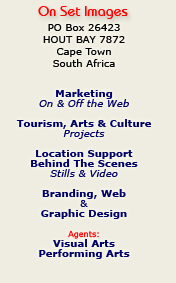
|
|
|

